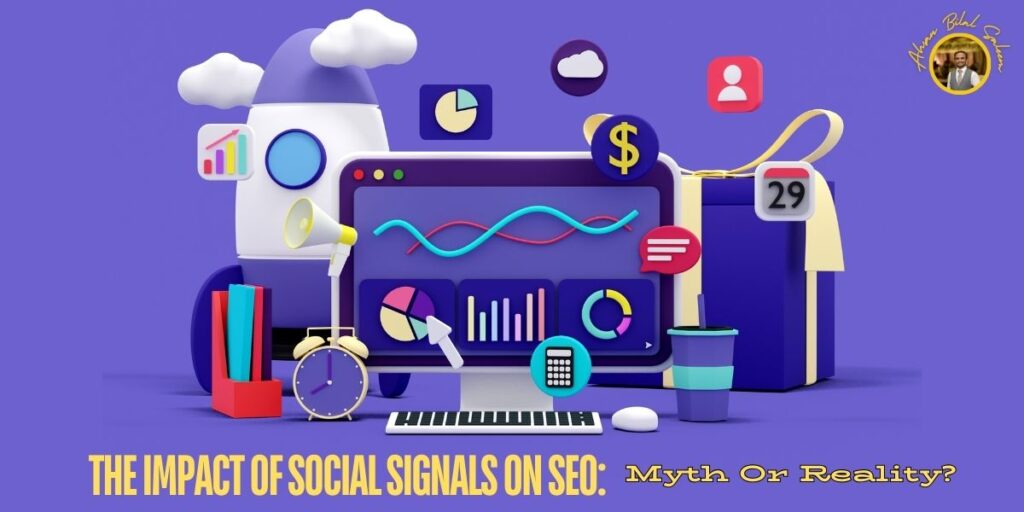In the ever-evolving world of SEO, countless factors influence how websites rank in search engine results. Among these factors, the role of social signals has been a topic of debate for years. Many marketers swear by the power of social media to boost SEO, while others argue that its impact is overstated. So, what’s the truth? Are social signals a myth, or do they play a significant role in SEO? This article delves into the relationship between social signals on SEO to separate fact from fiction.
What Are Social Signals?
Social signals refer to the engagement metrics from social media platforms like Facebook, Twitter, Instagram, LinkedIn, and others. These metrics include likes, shares, comments, retweets, and other forms of social interaction that indicate a piece of content is popular or engaging. The idea behind social signals impacting SEO is that content with high engagement on social media is deemed valuable, which could potentially influence its ranking on search engine results pages (SERPs).
The Argument for Social Signals Impacting SEO
Proponents of the idea that social signals influence SEO argue that:
- Increased Visibility and Traffic: Content that gains traction on social media often sees a spike in website traffic. More traffic can lead to higher engagement on the site, which is a positive signal for search engines. A surge in visits might lead to more time spent on the site, lower bounce rates, and even higher conversion rates, all of which are factors that search engines consider.
- Enhanced Backlink Opportunities: Popular content on social media is more likely to be shared by influencers and other websites, leading to an increase in backlinks. Backlinks are a known ranking factor, and high-quality, relevant backlinks can significantly boost a site’s SEO.
- Brand Authority and Credibility: Strong social media presence helps build brand authority. When a brand is frequently mentioned and discussed across social platforms, it can be perceived as a leader in its field. This perception can enhance click-through rates (CTR) from SERPs, another factor that search engines consider.
The Argument Against Social Signals Directly Impacting SEO
Despite the above points, there is no direct evidence that social signals themselves are a ranking factor in Google’s algorithm. Here’s why some believe social signals might be more myth than reality:
- Google’s Official Stance: Google representatives, including former Head of Web Spam Matt Cutts, have repeatedly stated that social signals are not direct ranking factors. While Google may crawl social sites and index content, the likes, shares, and comments do not directly influence rankings. This statement has led many to conclude that social signals have a minimal impact on SEO.
- Volatility and Inconsistency of Social Media: Social media trends can be fleeting. What’s well known today probably won’t be pertinent tomorrow. Search engines aim to deliver consistent and reliable results, and relying on social signals, which are highly volatile, would not align with this goal.
- Correlation vs. Causation: Many studies that suggest a correlation between social signals and higher rankings often confuse correlation with causation. While top-ranking pages often have strong social media presence, this does not mean that social signals caused those rankings. Instead, it’s likely that high-quality content naturally performs well on both social media and in search engines.
The Aberrant Advantages of Social Signs for SEO
While social signs may not be immediate positioning elements, their aberrant effect on Search engine optimization is irrefutable. Here’s how:
- Increased Content Visibility: Social media platforms provide a powerful avenue for content discovery. Sharing your content on social media can lead to increased visibility and, ultimately, more people linking to it. These backlinks are a key component of SEO.
- Brand Awareness and Trust: A strong social media presence can increase brand awareness and trust, leading to more branded searches. When users search specifically for your brand, it signals to search engines that your site is relevant and trustworthy, potentially improving your rankings.
- Driving Traffic to Your Website: Social media can be a significant traffic driver. While this traffic doesn’t directly influence SEO, the increased visitor numbers can lead to higher engagement rates, which are positive signals for search engines.
Conclusion: Myth or Reality?
The impact of social signals on SEO is both a myth and a reality. While social signals are not direct ranking factors in Google’s algorithm, they play a crucial role in the broader SEO ecosystem. The visibility, traffic, and backlink opportunities generated by strong social media presence can indirectly boost your site’s SEO performance.
Along these lines, while social signals alone won’t soar your rankings, they ought not be overlooked. A comprehensive digital marketing strategy that includes both SEO and social media marketing will create a synergistic effect, enhancing your overall online presence and helping you achieve long-term success in search engine rankings.
In the end, the key is to produce high-quality, engaging content that resonates with your audience, whether on social media or your website. When done right, the benefits will extend beyond just SEO, creating a robust online presence that attracts and retains customers.
